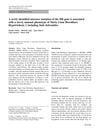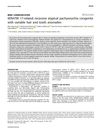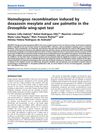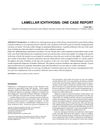 2 citations,
January 2019 in “Medizinische Genetik”
2 citations,
January 2019 in “Medizinische Genetik” The document reports findings on genetic research, including ethical concerns about genome editing, improved diagnosis of mitochondrial mutations, solving inherited eye diseases, confirming gene roles in epilepsy, linking a gene to aneurysms, and identifying genes associated with age-related macular degeneration.
 June 2024 in “Research Square (Research Square)”
June 2024 in “Research Square (Research Square)” Young women in West Bengal, India, with PCOS often have estrogen resistance, leptin receptor issues, folate deficiency, T2DM, and acanthosis, commonly linked to obesity.

Researchers found a genetic link for hereditary hair loss but need more analysis to identify the exact gene.
[object Object]  November 2022 in “Journal of the Endocrine Society”
November 2022 in “Journal of the Endocrine Society” A boy with a new NR5A1 gene mutation has a sex development disorder without affecting his adrenal glands.
January 2022 in “International journal of dermatology and venereology” A Chinese man with KID syndrome had a new mutation in the GJB2 gene.
 November 2020 in “International journal of contemporary pediatrics”
November 2020 in “International journal of contemporary pediatrics” Two siblings had a rare immune disorder caused by a FOXN1 gene mutation.
 April 2015 in “Experimental Dermatology”
April 2015 in “Experimental Dermatology” Melanoma risk tools need improvement, certain gene mutations cause skin diseases and could be treated by targeting those mutations, skin wrinkling may relate to lung aging due to genetic factors, and oxidative stress affects hair loss but can be reduced in low oxygen.
 10 citations,
March 2015 in “Journal of dermatology”
10 citations,
March 2015 in “Journal of dermatology” The boy's severe skin disorder is caused by two new mutations in his TGM1 gene.
 6 citations,
May 2012 in “Archives of Dermatological Research”
6 citations,
May 2012 in “Archives of Dermatological Research” A new mutation in the HR gene is linked to a rare form of hair loss with limb deformities.
 3 citations,
June 2022 in “European journal of human genetics”
3 citations,
June 2022 in “European journal of human genetics” A new type of pachyonychia congenita linked to a specific keratin gene mutation was found in two Pakistani families.
1 citations,
January 2015 in “The Journal of Dermatology” Genetic testing is crucial for diagnosing and managing non-Herlitz junctional epidermolysis bullosa.
1 citations,
January 2022 in “Annals of Dermatology” A new mutation in the MBTPS2 gene causes a mild form of IFAP syndrome.
1 citations,
September 2020 in “Journal of dermatology” Researchers found a new mutation in the LIPH gene of a woman with a rare hair condition.
November 2020 in “Journal of animal science/Journal of animal science ... and ASAS reference compendium” Certain genetic variants in PRLR and PCCA genes may lead to shorter hair in cattle, which could help with heat tolerance.
[object Object]  July 2019 in “Journal der Deutschen Dermatologischen Gesellschaft”
July 2019 in “Journal der Deutschen Dermatologischen Gesellschaft” A mother and daughter have a rare genetic hair loss disorder with no effective treatment.
35 citations,
August 2006 in “Molecular genetics and metabolism” Tissue-specific variation in mutant load complicates genetic counseling and prenatal diagnosis.
 3 citations,
October 2011 in “JAT. Journal of applied toxicology/Journal of applied toxicology”
3 citations,
October 2011 in “JAT. Journal of applied toxicology/Journal of applied toxicology” Doxazosin mesylate and saw palmetto cause genetic changes in fruit flies.
1 citations,
January 2018 in “Indian dermatology online journal” Early diagnosis and genetic evaluation of ADULT syndrome are crucial to reduce stress and medical costs.
69 citations,
January 2015 in “Cell & tissue research/Cell and tissue research” Keratin mutations cause skin diseases and could lead to new treatments.
2 citations,
May 2019 in “Small ruminant research” Mutations in specific llama genes may affect fiber quality for textiles.
1 citations,
August 2019 in “Journal of pediatric & adolescent gynecology” A new genetic change causing early stop in the androgen receptor gene was found in a patient with androgen insensitivity syndrome.
 July 2023 in “Journal of allergy and clinical Immunology. Global”
July 2023 in “Journal of allergy and clinical Immunology. Global” A 10-month-old boy with a rare combination of genetic conditions has severe immune deficiency and treatment challenges.
 February 2023 in “Cosmoderma”
February 2023 in “Cosmoderma” An infant with complete hair loss was diagnosed with a genetic disorder affecting hair growth.
August 2016 in “Journal of the American Academy of Dermatology” The infant likely has Hay-Wells syndrome and needs genetic testing and heart screening.
12 citations,
March 2013 in “The American journal of dermatopathology/American journal of dermatopathology” Birt–Hogg–Dubé Syndrome requires genetic testing for accurate diagnosis due to its similarities with tuberous sclerosis.
 25 citations,
August 2006 in “Human Reproduction”
25 citations,
August 2006 in “Human Reproduction” Oral contraceptives lower testosterone levels in women, especially those with certain genetic traits, and may be linked to increased breast cancer risk.
1 citations,
October 2023 in “Frontiers in Oncology” Genomic profiling for myeloid cancers can find important inherited mutations, but it's challenging when these mutations aren't related to the patient's symptoms.
 1 citations,
January 2019 in “International Journal of Medical Reviews and Case Reports”
1 citations,
January 2019 in “International Journal of Medical Reviews and Case Reports” Treatment with moisturizers improved the skin condition of a girl with a rare genetic skin disorder.
 September 2023 in “International journal of science and healthcare research”
September 2023 in “International journal of science and healthcare research” Genetic testing is crucial for diagnosing congenital atrichia, a rare condition causing irreversible hair loss.
 January 2022 in “Function”
January 2022 in “Function” Studying rare genetic disorders can help us understand and treat common diseases better.
















